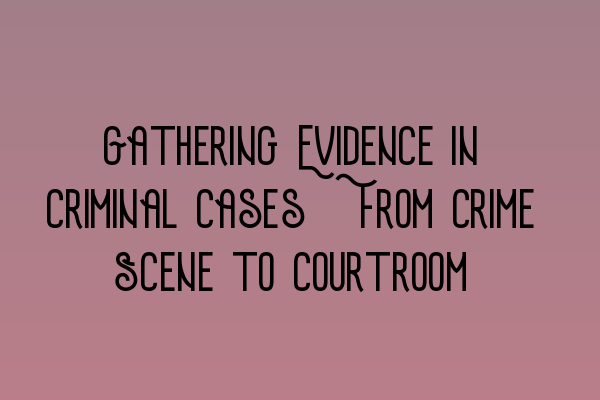Gathering Evidence in Criminal Cases: From Crime Scene to Courtroom
When it comes to criminal cases, gathering evidence is crucial in order to establish the truth and determine the outcome of the trial. The process of gathering evidence starts from the crime scene and continues all the way to the courtroom.
1. Crime Scene Investigation
At the crime scene, law enforcement officers and forensic experts play a vital role in collecting and preserving evidence. They carefully document and photograph the scene, collect physical evidence such as fingerprints, DNA samples, and any other relevant materials that may help establish the facts of the case.
In order to effectively gather evidence from the crime scene, it is important to follow proper procedures and protocols. This ensures that the evidence is admissible in court and maintains the integrity of the investigation.
2. Witness Statements
Witness statements are an essential part of gathering evidence in criminal cases. Witnesses provide their firsthand accounts of the events that took place, which can be crucial in establishing the sequence of events and identifying the individuals involved.
Lawyers and investigators need to conduct thorough interviews with witnesses to ensure that all relevant information is acquired. This includes obtaining statements from both prosecution and defense witnesses to establish a comprehensive overview of the case.
3. Expert Testimony
In certain criminal cases, expert testimony can be critical in explaining complex scientific or technical evidence to the court. Experts in various fields such as forensic science, psychology, or ballistics can provide their professional analysis and opinions, which can significantly impact the outcome of the trial.
It is important for legal professionals to identify the need for expert testimony early in the case and engage the appropriate experts to ensure the evidence is effectively presented to the court.
4. Document Examination
In many criminal cases, documents such as contracts, financial records, or medical reports can be crucial evidence. Legal professionals employ document examiners who specialize in analyzing these materials to determine their authenticity, validity, and relevance to the case.
Document examination often involves forensic techniques such as handwriting analysis, ink analysis, and paper analysis. These examinations can provide valuable evidence to support or refute claims made during the trial.
5. Digital Forensics
In today’s digital age, digital forensics has become an integral part of gathering evidence in criminal cases. With the increasing use of technology, digital evidence such as emails, text messages, social media posts, and surveillance footage can provide valuable insights into the case.
Digital forensics experts specialize in retrieving, analyzing, and presenting digital evidence in a legally admissible format. They use sophisticated tools and techniques to ensure the integrity and authenticity of the digital evidence.
6. Chain of Custody
Throughout the process of gathering evidence, maintaining a proper chain of custody is essential. This refers to the documentation and tracking of the evidence from the time it is collected to its presentation in court. It ensures that the evidence is secure, untampered with, and can be relied upon to establish the facts of the case.
Lawyers and investigators need to adhere to rigorous protocols to protect the chain of custody and guarantee the admissibility and reliability of the evidence in court.
